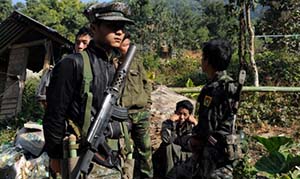Burma Army Makes a Mockery of the Census and its Backers
By Burma Partnership • April 21, 2014We would like to dedicate our Weekly Highlights today to U Win Tin, Co-founder and patron of the National League for Democracy, for always standing up for the oppressed and voiceless. We are deeply saddened Ba Ba passed away this morning. Although he is no longer physically with us, his unwavering righteous mind and courage will continue to be the guiding light and the inspiration for us and for all who continue in their fight for genuine democracy and freedom of speech in Burma.
 Just 48 hours after peace talks in Rangoon concluded on 8 April between the government and ethnic non-state armed groups, including the Kachin Independence Organization (KIO), the Burma Army launched another round of offensives in southern Kachin State against the Kachin Independence Army (KIA). Fighting has been on-going since, forcing thousands of Kachin, Shan, and Palaung villagers to flee, many of whom had already been displaced in this conflict.
Just 48 hours after peace talks in Rangoon concluded on 8 April between the government and ethnic non-state armed groups, including the Kachin Independence Organization (KIO), the Burma Army launched another round of offensives in southern Kachin State against the Kachin Independence Army (KIA). Fighting has been on-going since, forcing thousands of Kachin, Shan, and Palaung villagers to flee, many of whom had already been displaced in this conflict.
Burma Army soldiers originally used the nationwide census as a pretext to accompany enumerators into KIA territory and launch attacks on various KIA outposts. State media has reported 22 dead due to the resulting clashes but the true figure is probably much higher. Meanwhile, according to a statement released by a coalition of humanitarian groups working in the conflict-affected areas, over three thousand villagers have been forced to flee, many of whom had to leave an internally displaced people (IDP) camp, from which they had settled after previous attacks. Several local news sources have stated the figure of those displaced maybe as high as ten thousand people.
The fighting took place near the China border and many people crossed, or at least attempted to cross, into China, to find sanctuary against the mortar shelling and gunfire. Yet China closed the official border crossing and its soldiers are patrolling the area in an attempt to prevent people entering its’ territory, leaving them at the mercy of Burma Army troops. Those who did manage to cross are facing pressure from Chinese authorities to return. China is a signatory to the Refugee Convention and as such is obligated not to violate the principle of non-refoulement, which prohibits the forced return of refugees to places where their life is in danger. With the border so close to the fighting, China has both a moral and legal obligation to provide safe passage for those fleeing conflict into its territory.
This is yet another black eye for the United Nations Population Fund (UNFPA) and its donors who were behind the poorly planned census that now bears partial responsibility for extreme violence in both Kachin and Arakan States. It is also a black eye for those who are espousing the success of the peace process. These attacks came just two days after peace talks in Rangoon. While the government talks peace, the army shoots its guns.
The Burma Army remains the most powerful institution in Burma and is completely unreformed. It still commits widespread human rights violations with impunity, continues to wage war in ethnic areas, raping and sexually assaulting women and children of ethnic minority, and has shown zero commitment to the peace process. Furthermore, it has used the nationwide census, which has been heavily backed financially by western governments and donors , and planned by the UN, as a pretext to cause more suffering to the ethnic civilian population in the most impoverished war-torn border areas. The international community needs to not only condemn the actions of the Burma Army, but take concrete punitive measures against the government in order to demonstrate that it is taking the issue seriously.
The western donors and governments who are behind the census must also swallow their pride and accept that this operation has been a failure and has certainly not adhered to the principle of ‘do no harm.’ Harm has been done, and responsibility must be taken for this harm to prevent further abuse and to heal the wounds. A start would be to urge the Burma Government to provide unhindered access and humanitarian aid to the local organizations that are caring for the displaced people where there is a current shortage of medicine, accommodation, drinking water and blankets. Meanwhile, the Burma government and its peace negotiating team must stop the pretence that it has control over the Burma Army, and start to implement reforms that reduce the power of this destructive institution. They must play a proactive role in holding Burma Army’s activities in accordance with international human rights and humanitarian norms, while urging them to commit to the peace process. Otherwise, there will never be an end to the suffering of Burma’s ethnic people.
Tags: Armed Conflict, Census, Kachin, U Win TinThis post is in: Blog
Related PostsBurma Army Displays Blatant Disregard for 21st Century Panglong Peace Process
On Union Day, Reappraisal of the Peace Process is Needed
ရွမ္းျပည္တိုိးတက္ေရးပါတီ၊ ရွမ္းျပည္တပ္မေတာ္ SSPP/SSA ထုတ္ျပန္ေၾကညာခ်က္
Time for the Government to Accept the Reality of Human Rights Problems, Take Effective Measures and Move Forward
Kachin Region: War Torn Displaced Village Profiles









 All posts
All posts